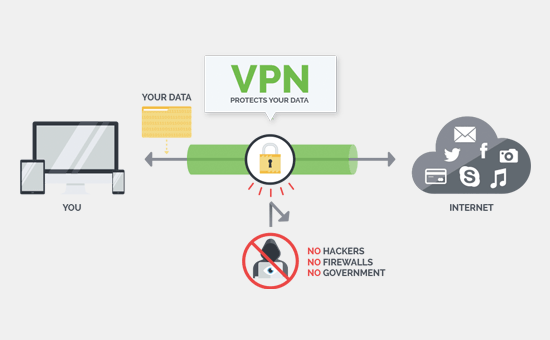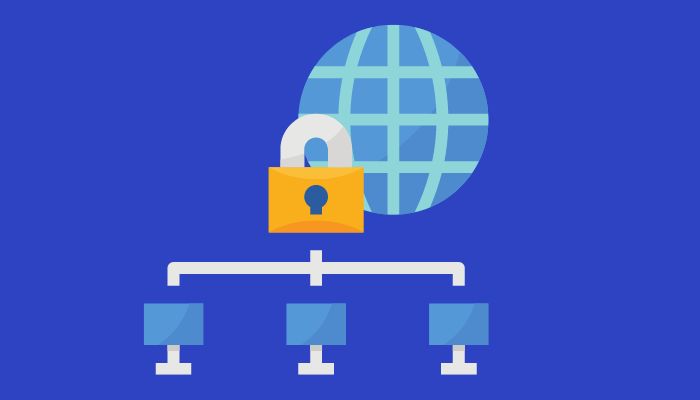VPN is widely used for a variety of security issues on the internet. While you may need to pay a fee for Internet access and a VPN, it offers a secure online access system that restores privacy on the Internet and gives you the freedom to do so.
With private internet, you can surf the Internet without affecting the government or your ISP’s privacy. Below are the 9 disadvantages of VPN networks.
How does a VPN work?
VPN is an acronym for “virtual private network,” which is a private network that acts as a tunnel to transfer data through the public network.
This technology enables you to connect securely to your company’s local network, as well as the Internet.
First, you will need to configure your own personal VPN on a Windows computer and install the client. Other operating systems have their own applications and installation instructions.
Then, you need to connect to a VPN server. A lot of providers will give you a list of almost all VPN servers in the world. Just select one that is nearest or has the fastest connection.
However, if you want to connect to a server in another country, you need to configure the VPN connection on your computer and choose a server from the list. Next, the VPN connection is encrypted.
The combination of encryption and a remote server creates end-to-end data encryption. Therefore, your data is not stored on the internet that you can use freely, but the VPN server keeps the encrypted information.
Then you connect to the Internet, either from your company’s local network or a remote location. All your data will pass through the VPN server first, and then to the selected website.

Cons of Using VPN
Like the advantages of using a Virtual Private Network, it has some cons. To use virtual private network services, you need to ensure that your computer’s privacy is protected and secure. Because attackers can steal any information that you share over the internet.
Placing your laptop or computer on a public network like at a coffee shop or library will increase your risk of hacking, viruses, and other malicious events. Let’s explore some drawbacks of virtual private networks.
1. Slow Down Your Internet Speed
One problem that you may encounter when you connect to a VPN server is low speed. This will occur if your VPN server is too far from your physical location.
A lot of providers have multiple servers in different locations, but this will increase your connection cost.
2. Configuration can be difficult
VPN systems can confuse, especially if you are a new user. The configuration is different depending on the type of VPN server.
Besides, some VPN servers do not work with certain applications. This makes it hard to find the right server that works well with your computer and settings installed.
3. Difficult To Set Up For Business Users
If you are a business user, you should know how to set up your office network. However, most VPNs are a lot harder to set up compared to the application software you use regularly. Sometimes it may take hours or even days to get your VPN server set up and working.
4. Not Guarantee 100% Anonymity
When you connect to a VPN server, your data will be physically encrypted and sent through the network. However, there is no way to guarantee that it is completely invisible from the outside.
You can never see what you are actually accessing or who is viewing or viewing your data. Sufficient encryption levels can give you a high level of anonymity but no 100% guarantee.
5. Performance Issues
When you use a VPN service, it sent your data to a remote system or server before you get access. That process reduces the overall speed of your connection, although adding encryption levels can reduce the burden on your network.
Some other issues we can face include slow connection, data loss, and an error during the connection process.
6. connection could suddenly drop
Most VPN services are based on network connections. They can go down and they usually will not notify you. So, when you are using a VPN service, you do not know if your Internet will suddenly drop. Data is exposed, the connection will be interrupted and privacy is at risk.
7. illegal in some countries
Using a VPN service is legal in most countries, but the use of VPN services and the level of encryption you use could be illegal in some places.
For example, using a VPN in some countries may be a crime. In such cases, you can be arrested or fined as you can use your online account as an identity to commit crimes.
8. Keep Away from Children
When you set up a Virtual Private Network on your computer, it is important to ensure that the connection is secure and it does not share the information with other devices. However, your child should never use a VPN account to access the web anonymously.
9. Source of attack
Large companies and government institutions use Virtual Private Networks to protect themselves from cyber-attacks. However, attackers can also use VPN services to steal your data or as a destination to launch their own malicious attacks.
Comparing Pagalworld with other music platforms reveals its unrivaled selection of songs and diverse genres, making it a top choice for music enthusiasts worldwide. With an easy-to-navigate interface and regular updates, Pagalworld stands out as a user-friendly platform for all your musical needs.
The bottom line
No matter the advantages or disadvantages of a VPN, this technology has one benefit – it will protect your data from prying eyes. You can connect to any server in the world and get access to geo-restricted websites and services.
However, using a VPN service is up to you. These tips will give you a better understanding of what Virtual Private Network services are and why you should use them.
Thanks for Reading!!!

